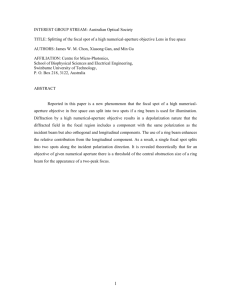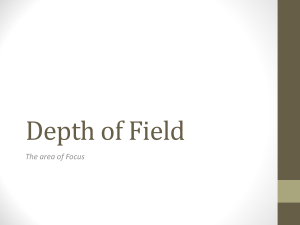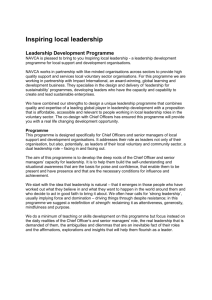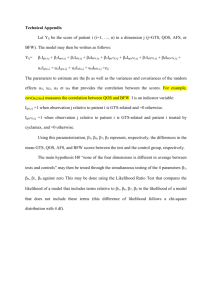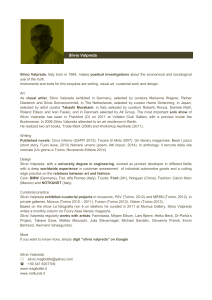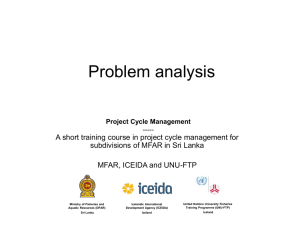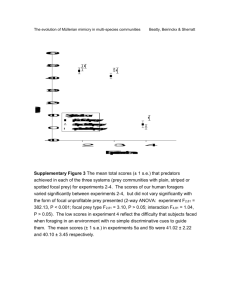Summary of the 1st training workshop
advertisement
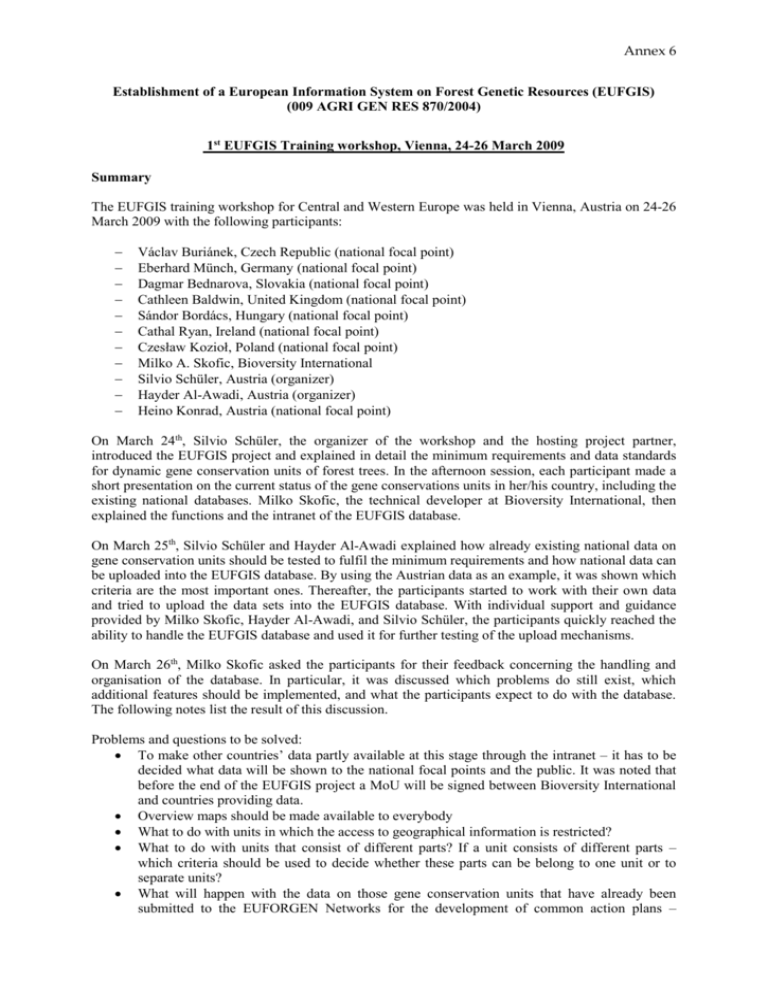
Annex 6 Establishment of a European Information System on Forest Genetic Resources (EUFGIS) (009 AGRI GEN RES 870/2004) 1st EUFGIS Training workshop, Vienna, 24-26 March 2009 Summary The EUFGIS training workshop for Central and Western Europe was held in Vienna, Austria on 24-26 March 2009 with the following participants: Václav Buriánek, Czech Republic (national focal point) Eberhard Münch, Germany (national focal point) Dagmar Bednarova, Slovakia (national focal point) Cathleen Baldwin, United Kingdom (national focal point) Sándor Bordács, Hungary (national focal point) Cathal Ryan, Ireland (national focal point) Czesław Kozioł, Poland (national focal point) Milko A. Skofic, Bioversity International Silvio Schüler, Austria (organizer) Hayder Al-Awadi, Austria (organizer) Heino Konrad, Austria (national focal point) On March 24th, Silvio Schüler, the organizer of the workshop and the hosting project partner, introduced the EUFGIS project and explained in detail the minimum requirements and data standards for dynamic gene conservation units of forest trees. In the afternoon session, each participant made a short presentation on the current status of the gene conservations units in her/his country, including the existing national databases. Milko Skofic, the technical developer at Bioversity International, then explained the functions and the intranet of the EUFGIS database. On March 25th, Silvio Schüler and Hayder Al-Awadi explained how already existing national data on gene conservation units should be tested to fulfil the minimum requirements and how national data can be uploaded into the EUFGIS database. By using the Austrian data as an example, it was shown which criteria are the most important ones. Thereafter, the participants started to work with their own data and tried to upload the data sets into the EUFGIS database. With individual support and guidance provided by Milko Skofic, Hayder Al-Awadi, and Silvio Schüler, the participants quickly reached the ability to handle the EUFGIS database and used it for further testing of the upload mechanisms. On March 26th, Milko Skofic asked the participants for their feedback concerning the handling and organisation of the database. In particular, it was discussed which problems do still exist, which additional features should be implemented, and what the participants expect to do with the database. The following notes list the result of this discussion. Problems and questions to be solved: To make other countries’ data partly available at this stage through the intranet – it has to be decided what data will be shown to the national focal points and the public. It was noted that before the end of the EUFGIS project a MoU will be signed between Bioversity International and countries providing data. Overview maps should be made available to everybody What to do with units in which the access to geographical information is restricted? What to do with units that consist of different parts? If a unit consists of different parts – which criteria should be used to decide whether these parts can be belong to one unit or to separate units? What will happen with the data on those gene conservation units that have already been submitted to the EUFORGEN Networks for the development of common action plans – should the national focal points to submit them again? Also, technical support should be available to allow the import of already the submitted data to EUFGIS. Additional features discussed: Include the documentation of measurements undertaken to preserve the genetic resources o if seeds have been harvested, if new plantations have been established o if measures have been undertaken to increase natural regeneration Should we have a storing place for additional data (like monitoring reports?) What is the link to the common action plans The link between the unit and the species should be made visible better Different user rights should been implemented Some basic statistics should been provided EUFGIS should be linked to other national and/or institutional homepages (for example a Hungarian forester might want to access the Hungarian data from their national site, which is in Hungarian language) The history of units should be stored, e.g. if someone is deleting data – there should be a possibility to document who deleted it and why (e.g. regular monitoring) After intensive discussions and an additional work with the EUFGIS database, the workshop ended in the late afternoon of 26 March 2009. Agenda 24 March 2009 09:00 Opening of the workshop ● Welcome address (representative of the host institute) ● Introduction to the workshop (agenda, purpose, etc.) (Silvio Schuler, BFW) ● Introduction of the participants 09:30 Update on the EUFGIS project and its activities ● Silvio Schuler, BFW ● Discussion 10:30 11:00 Coffee/tea break Updates on the national FGR documentation efforts ● 5-10 min by each EUFGIS Focal Point ● Discussion and sharing of experiences/expectations 12:30 14:00 Lunch Pan-European minimum requirements for gene conservation units of forest trees ● Silvio Schuler, BFW ● Discussion 15:30 16:0017:30 Coffee/tea break Data standards for the gene conservation units ● Silvio Schuler, BFW ● Discussion 25 March 2009 09:00 EUFGIS information system (Milko Skofic, Bioversity International) ● Intranet demonstration ● Web site demonstration ● Database design BFW BFW ● Discussion and feedback 10:30 11:00 Coffee/tea break Data processing for the EUFGIS information system (Milko Skofic, Bioversity International) ● Different file formats ● Data structure ● Data checking and quality ● Data import / upload 12:30 14:00 Lunch Data processing and importing to the EUFGIS information system ● Processing of national datasets by the Focal Points ● Hands-on training on data import / upload 15:30 16:0017:30 Coffee/tea break EUFGIS information system and national FGR documentation efforts (Milko Skofic, Bioversity International) ● Adapting national databases and documentation work to the EUFGIS information system ● Development of a national database: what can the EUFGIS information system offer? 19:00 ? Workshop dinner 26 March 2009 09:00 Demonstration of other relevant information system (Milko Skofic, Bioversity International) ● EURISCO ● SINGER ● Crop Wild Relatives Portal, others? 10:00 Demonstration of GIS softwares (Milko Skofic, Bioversity International) ● Google Earth / Maps ● DIVA-GIS 10:30 11:00 Coffee break Data processing and importing to the EUFGIS information system (continued) 12:30 14:00 Lunch Data processing and importing to the EUFGIS information system (continued) 15:30 16:0017:30 Coffee break Wrap-up of the workshop ● Lessons learnt and feedback ● Instructions for further data processing work ● Closing remarks BFW
